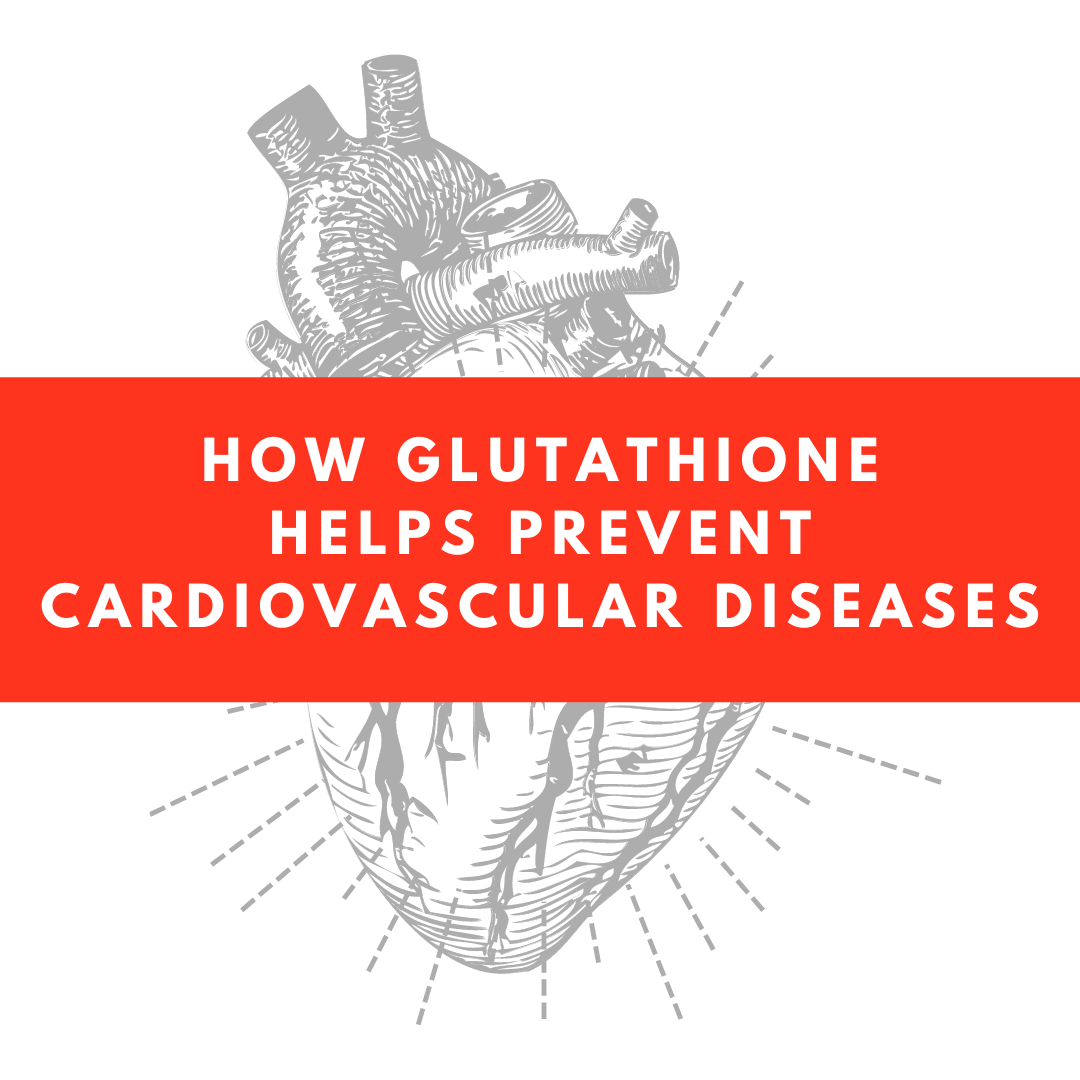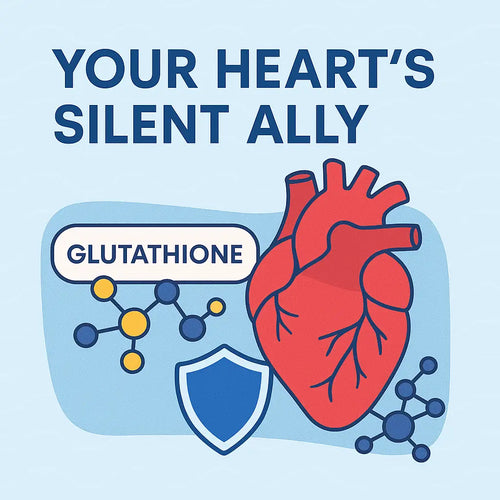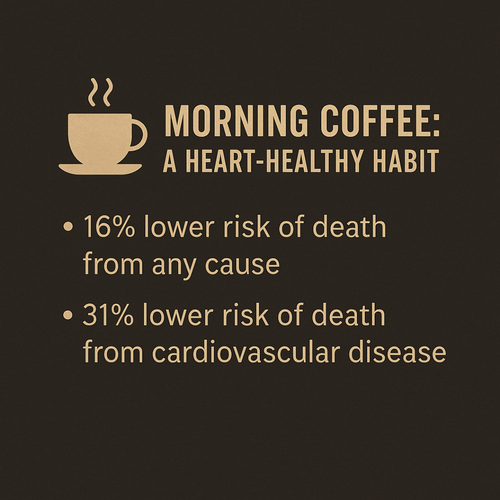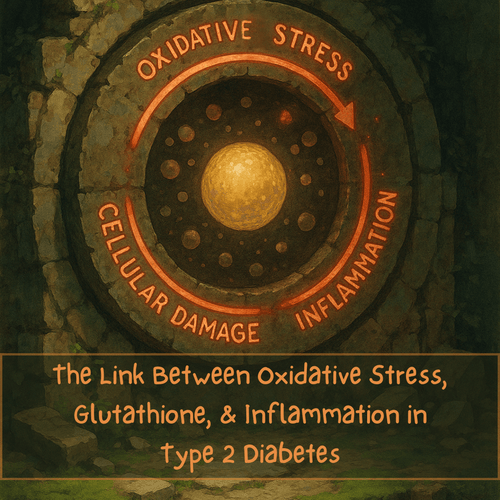
Cardiovascular diseases (CVDs) are a leading cause of death worldwide, driven largely by conditions like coronary artery occlusion, hypertension, and strokes. At the root of many of these issues is oxidative stress, a harmful process that occurs when there’s an imbalance between free radicals and antioxidants in the body. Enter glutathione—a naturally occurring antioxidant that’s gaining attention for its role in protecting heart health by neutralizing oxidative damage.
In this post, which is based on research review by Matuz-Mares D et al. (2021), we’ll explore how glutathione works to prevent cardiovascular diseases, what the science says about its benefits, and practical ways to boost your glutathione levels to improve your heart health.
What is Oxidative Stress and Why Does it Matter for Heart Health?
Before diving into glutathione’s role, it’s essential to understand oxidative stress. This condition occurs when the body produces more reactive oxygen species (ROS) and reactive nitrogen species (RNS) than it can neutralize. ROS includes free radicals like superoxide anion (O2•–) and hydroxyl radical (•OH), while RNS includes nitric oxide (NO•) and peroxynitrite (ONOO–).
These reactive species are necessary in small amounts for processes like cell signaling, but when overproduced—often due to poor lifestyle habits like smoking, an unhealthy diet, or exposure to pollution—they start to attack and damage healthy cells. This leads to various diseases, including atherosclerosis, hypertension, and heart failure.
How Oxidative Stress Impacts the Cardiovascular System
Excessive ROS generation can cause endothelial dysfunction, which affects the inner lining of blood vessels, reducing nitric oxide (NO•) availability. This leads to the stiffening of arteries, increased blood pressure, and inflammation, all of which contribute to cardiovascular complications. The damage doesn’t stop there—ROS also accelerates the oxidation of LDL cholesterol, contributing to plaque formation in arteries (atherosclerosis), which can lead to heart attacks and strokes.
Glutathione: The Body’s Defense Against Oxidative Stress
Glutathione (GSH) is a tripeptide made up of three amino acids: glutamate, cysteine, and glycine. It’s one of the most powerful antioxidants in the body, acting as a key player in neutralizing ROS and RNS. Here’s how it works:
-
Neutralizing Free Radicals: Glutathione directly neutralizes reactive species like superoxide anions and hydroxyl radicals, preventing them from damaging cellular structures like lipids, proteins, and DNA.
-
Regenerating Other Antioxidants: GSH doesn’t just work alone. It helps regenerate other antioxidants like vitamins C and E, allowing them to continue their protective work.
-
Supporting Detoxification: In the liver, glutathione helps detoxify harmful compounds, reducing oxidative stress not only in the liver but throughout the body.
Glutathione’s Role in Cardiovascular Health
So, how does glutathione impact heart health specifically? The relationship between glutathione and the prevention of cardiovascular diseases is closely tied to its ability to maintain redox balance and reduce oxidative stress, which is a key driver of heart conditions.
-
Prevents Atherosclerosis: By neutralizing ROS, glutathione reduces the oxidation of LDL cholesterol, a key step in the development of atherosclerosis. Studies have shown that increased glutathione levels can improve vascular function by boosting nitric oxide availability, which helps dilate blood vessels and reduce blood pressure.
-
Protects Against Heart Failure: During heart failure, the body’s oxidative stress increases, leading to a vicious cycle of ROS production. Glutathione helps by restoring antioxidant defenses, improving mitochondrial function, and protecting heart muscle cells from damage.
-
Reduces Risk of Hypertension and Stroke: Studies suggest that low glutathione levels are linked to high blood pressure and an increased risk of stroke. Glutathione reduces oxidative damage to blood vessels, helping maintain healthy blood pressure levels.
How to Boost Glutathione Levels
Given glutathione’s essential role in combating oxidative stress and protecting cardiovascular health, it’s worth considering how to boost your body’s glutathione levels naturally. Here are a few effective strategies:
1. Dietary Changes
A healthy diet can naturally support glutathione production. Eating foods rich in sulfur, such as garlic, onions, and cruciferous vegetables (like broccoli, cauliflower, and kale), can help your body synthesize more glutathione. Cysteine, one of the amino acids in glutathione, is also found in high-protein foods such as meat, fish, and eggs.
For more information on how to adjust your diet to reduce cardiovascular risk, check out this post on diet and cardiovascular risk.
2. Supplements for Cardiovascular Health
While dietary changes are crucial, supplements can also help increase glutathione levels. One option to consider is Effective Liposomal Glutathione, a supplement that uses CELLG8® liposomes for higher bioavailability. Research shows it can raise blood glutathione levels 20 times more than standard forms and even reduce blood mercury by 39% within 30 days. This supplement is designed for those who need higher doses of glutathione for detoxification and immune support.
You can learn more about this supplement here or check out our other supplements for cardiovascular health.
3. Regular Exercise
Physical activity, particularly moderate aerobic exercise, has been shown to boost the body’s antioxidant defenses, including increasing glutathione levels. Interestingly, high-intensity exercise might reverse some aging-related cardiovascular issues by improving antioxidant capacity and reducing oxidative stress. Learn more about how exercise can improve heart health in this article.
4. High-Quality Sleep
Sleep plays a crucial role in maintaining the body’s antioxidant defenses. Poor sleep can reduce glutathione levels, so ensuring you get enough high-quality sleep is vital for your heart and overall health.
Glutathione as a Cardiovascular Ally
It’s clear that oxidative stress plays a major role in the development of cardiovascular diseases. Glutathione, as a master antioxidant, is critical for neutralizing harmful reactive species, protecting cells, and maintaining heart health. Whether through dietary changes, supplements, exercise, or sleep, boosting your glutathione levels can be a powerful way to reduce your cardiovascular risk.
For those looking for a convenient option, Effective Liposomal Glutathione might be the key to maintaining optimal glutathione levels and protecting your heart from oxidative stress.
If you’re serious about safeguarding your heart health, don’t underestimate the power of this tiny but mighty molecule.
By understanding the science behind glutathione and its effects on heart health, you can take proactive steps to reduce your cardiovascular risk and live a healthier life.
FAQs
1. What causes oxidative stress in the body?
Oxidative stress occurs when there’s an imbalance between the production of reactive oxygen species (ROS) and the body’s ability to neutralize them with antioxidants. Factors like poor diet, pollution, smoking, and excessive alcohol consumption contribute to oxidative stress.
2. Can glutathione prevent heart attacks?
While no single supplement can entirely prevent heart attacks, glutathione plays a key role in reducing the oxidative stress that contributes to cardiovascular diseases. Higher glutathione levels are associated with better heart health and lower risk of heart disease.
3. How can I naturally increase my glutathione levels?
You can boost glutathione levels through diet, exercise, sleep, and supplements. Foods rich in sulfur, such as garlic, onions, and cruciferous vegetables, can help the body produce more glutathione. Regular physical activity and proper sleep also help maintain glutathione levels.
4. Are there side effects to taking glutathione supplements?
Glutathione supplements are generally safe for most people, but some may experience mild side effects such as bloating or cramping. It’s always a good idea to consult with a healthcare provider before starting any new supplement.
Reference
Matuz-Mares D, Riveros-Rosas H, Vilchis-Landeros MM, Vázquez-Meza H. Glutathione Participation in the Prevention of Cardiovascular Diseases. Antioxidants (Basel). 2021 Jul 29;10(8):1220.









